March 19, 10:00 am Literature - Ballina, NSW, Australia
Time for a few more de Maupassant short stories.
"Complete Original Short Stories of Guy de Maupassant" (Volume 1)
- "Two Little Soldiers"
- Two close friends meet a milk-maid who comes between them. The one man then commits suicide. Powerful.
- "Father Milon"
- An old French man confesses to killing 16 Prussian soldiers. Simple revenge.
- "A Coup D'Etat"
- A small village deals with the news that France has been declared a republic. But it remains a small village.
March 18, 8:30 am Literature
The 13 hours was largely spent sleeping. I did play a few games of Go on my iPad but didn't feel much like doing anything that required much thought. The plane was cramped and the food bland. But it flew just fine, which is the important thing.
Now for some reading of Guy de Maupassant's short stories (on the iPad). I also made a few notes using the Pages app on the iPad.
"Complete Original Short Stories of Guy de Maupassant" (Volume 1)
- "The Lancer's Wife"
- War, revenge, and the love of mothers for their families. Excellent!
- "The Prisoners"
- A French lass captures 6 Prussian soldiers by trapping them in her cellar. Clever.
March 16, 8:00 am Literature

This morning seemed a good time to revisit this book. Some days I am more receptive to the words than on other days. Seems reasonable.
Here are a few passages from the 9th chapter that I liked:
"Reason cannot walk where this poem is going." [p. 114]
"Others, like me, love the word-bunches called poetry." [p. 116]
"Comfort the grieving.
not those who think of only how to sell things.
The sensualities they live for
are sharp points pushing into their flesh." [p. 116]
"Science and theology would be just whims of the wind," [p. 119]
"No matter how fast you run,
your shadow more than keeps up.
Sometimes it's in front." [p. 120]
"We will drink all this wine tonight
because it is spring. It is." [p. 121]
"Mountain holding rubies secretly inside,
should I love more you,
or your modesty?" [p. 122]
March 15, 5:00 PM Literature
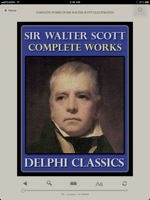
I have now finished reading this novel (The Talisman). I loved it. Perhaps strangely, I found much of the language to be similar to Shakespeare. The ending had a few nice twists that I enjoyed.
March 14, 4:00 PM Literature

I am now past the half-way point in "The Talisman". The age of chivalry is alive and well. So is the age of envy and deceit. It is a good yarn of the time of the crusades in the Middle East.
March 13, 8:10 am Literature
I am taking a break from "The Quincunx" and moving to some lighter fare that does not require detailed notes. But I will return.
I have begun reading The Talisman by Sir Walter Scott. I have a clear image of the book that I read while at my grandparent's house in Edmonton. It was a small hardcover book in dark green and was part of the Modern Library series. While I have this image, and the overall sense of having thoroughly enjoyed it, I have no memory of the detail of the story. It is time to rectify this.

The version I have is an ebook on my iPad2.
I have now read the first 4 chapters and am enjoying it. These chapters provide a delightful comparison of the views of two warriors, a Crusader and a Saracen, who begin the novel by having a fight to the death in the desert and end up having a truce and enjoying one another's company. Delightful. Quite a contrast with today's dogmatic and intransigent views.
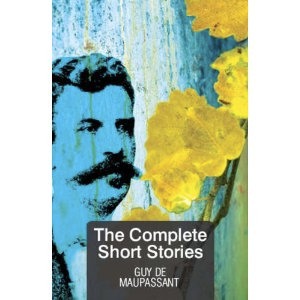
I recall seeing a notice from amazon.com about a new collection of short stories by Guy de Maupassant being published. Many literary critics consider de Maupassant as the father of the short story. I have read a number of his stories over the years and consider them true masterpieces. Instead of buying the new collection I decided to check gutenberg.com and soon had the complete collection of short stories (13 volumes) in an ebook format.
The first story is called "Boule de Suif" and is a true classic - probably one of the best short stories ever written. I reread it tonight and it is just as good as the last time I read it. I also read the next story, "Two Friends", and marvelled at it as well. Beautiful!
March 9, 7:20 am Literature
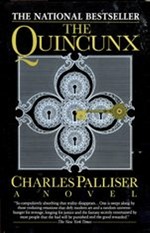
I have completed making notes for the 5th chapter of Book 1 of the story. The next chapter is the beginning of Book 2.
Here is a link to my notes on the detail.
March 8, 5:00 PM Literature

I have finished reading the first "Book" of this story, consisting of 5 chapters, and have made detailed notes for the first 4 chapters. The level of detail is truly amazing. Hardly a paragraph goes by without some new information being revealed. Chapter 4 gives the first sense of the level of evil underlying the story line.
Here is a link to my notes on the detail.
March 7, 3:00 PM Literature

I read another chapter of Rumi's "The Big Red Book" this morning. But for the second day in a row I did not feel inclined to note any passages for inclusion in this set of notes.
I have been trying to decide on my next selection for reading. I am looking for something with a bit of a challenge to it. I then noticed a novel called "The Quincunx" by Charles Palliser. I remember starting this book about a decade ago but gave it up after about a third of the way through as being far too convoluted to disentangle. I fact there was a bookmark in it on page 276. As I recall the story was some form of crime mystery. Time to give this a serious try.
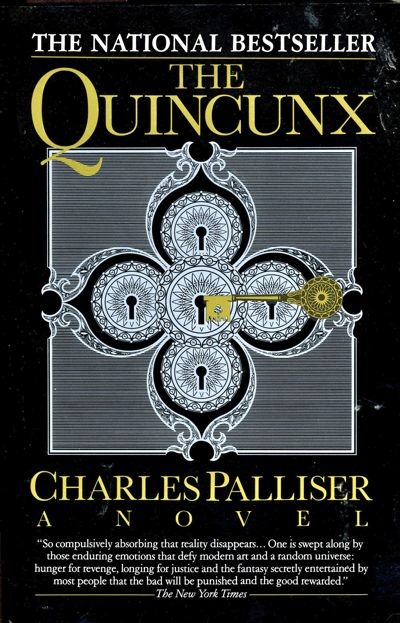
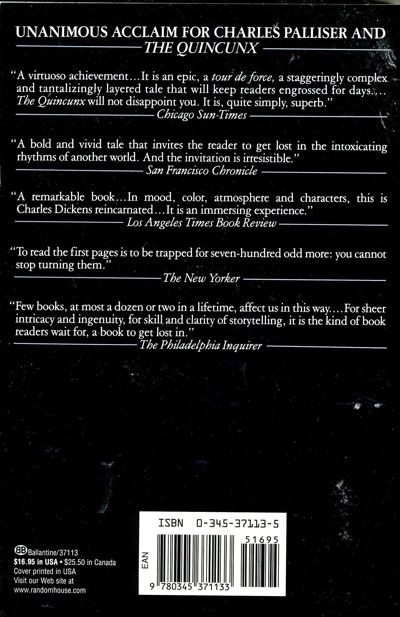
This is a good place to practise what I call slow reading. The idea is to develop a method of keeping notes that will help me keep track of the details. To begin, I think I need one web page that identifies the details ( Quincunx Details ) and another that tries to establish a timeline of the events (Quincunx Timeline ). I may need to revise this approach as I get into the story, but this is a start.
March 6, 10:30 am Literature

I read Chapter 7 of Rumi's "The Big Red Book" which focused on truth. This was the first chapter where I did not identify any passages that I wanted to highlight and insert into this web site.
March 5, 9:00 am Literature
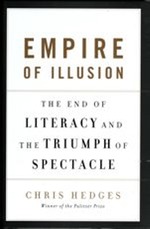
I have finished reading Chris Hedges' "Empire of Illusion". It is incredibly powerful, and more than a little discouraging. But difficult to refute. I was misled by the subtitle - The End of Literacy and the Triumph of Spectacle". There is actually very little in the book about literacy, but the triumph of spectacle is everywhere. It is a small book, only 5 chapters and 193 pages of main text. The book was published in 2009, only 3 years ago.
The book is, in my eyes, too important to just say that I enjoyed it. I will try to capture a few quotes and add my commentary to them.

Hedges: Chapter I The Illusion of Literacy
He begins by describing a wrestling scenario, and goes on, "And the most potent story tonight , the most potent story across North America, is one of financial ruin, desperation, and enslavement of a frightened and abused working class to a heartless, tyrannical, corporate employer. For most, it is only in the illusion of the ring that they are able to rise above their small stations in life and engage in a heroic battle to fight back." [p. 5]
Me: This got me off on the wrong foot. I agree with the statement about the most potent story. And other than the occasional mention of a story about a particular story there is little mention of this in the public media. But to then say that we watch wrestling as a form of escape is silly. Most people do not go to wrestling matches, and most people do not watch it on tv. And to immediately characterize corporations as "heartless and tyrannical", with no accompanying justification, caught me off guard.
Hedges: "The camera has created a culture of celebrity; the computer is creating a culture of creativity. As the two technologies converge - broadband tipping the Web from text to image; social-networking sites spreading the mesh of interconnection ever wider - the two cultures betray a common impulse. Celebrity and connectivity are both ways of becoming known. That is what the contemporary self wants. It wants to be recognized, wants to be connected. ... if the property that grounded the self in Romanticism was sincerity, and in modernism was authenticity, then in postmodernism it is visibility." [p. 22-23]
Me: The above quote is actually by another critic but it is a good analysis. However I am not sure how many people really want to be recognized and connected. Particularly if one is recognized as being a bit of a fool. But Facebook and Twitter are indeed popular.
Hedges: "This cult of distraction, as Rojek points out, masks the real disintegration of culture. It conceals the meaninglessness and emptiness of our own lives. It seduces us to engage in imitative consumption. It deflects the moral questions arising from mounting social injustice, growing inequalities, costly imperial wars, economic collapse, and political corruption." [p. 38]
Me: Once again, I was surprised. I was not aware that our culture was disintegrating. Maybe it is, but that seems like an exaggeration to me. But I agree that there is little public debate that focuses on the morality of various actions. In many cases I suspect that people would be surprised to hear that there is even a moral issue underlying an activity.
Hedges: He quotes Neil Postman, "What Orwell feared were those who would ban books. What Huxley feared was that there would no reason to ban a book, for there would be no one who wanted to read one. Orwell feared those who would deprive us of information. Huxley feared those who would give us so much that we would be reduced to passivity and egoism. Orwell feared that the truth would be concealed from us. Huxley feared the truth would be drowned in a sea of irrelevance." [p. 39]
Me: I lean toward Huxley. The debate on global warming is a case in point. Another is the ongoing crisis about the Euro. A third is the opposing views on how to fund health care. A fourth is education. Here the debate is about how to fund it rather than on what should be in the curriculum.
Hedges: "We are a culture that has been denied, or has passively given up, the linguistic and intellectual tools to cope with complexity, to separate illusion from reality. We have traded the printed word for the gleaming image." [p. 44]
Me: Now we have the argument about the end of literacy. This is backed up with some figures that are shocking. Including, "And it is not much better beyond our borders. Canada has an illiterate and semiliterate population estimated at 42 percent of the whole, a proportion that mirrors that of the United States." [p. 44]
Literacy is important. So is thinking. The two are inter-related. But some documentary television programs, or movies such as those by Michael Moore, provide an alternative entry into important issues for people with low literacy skills. And literacy is much more than simply being to vocalize what is on the page. It is about understanding what is written, or said. And then being able to go beyond what is written to formulate potential alternatives and next steps.
Hedges: "Those captive to images cast ballots based on how candidates make them feel. They vote for a slogan, a smile, perceived sincerity, and attractiveness, along with a carefully crafted personal narrative of the candidate." [p. 46]
Me: That may well be true. But a deeper, more fundamental issue, is how to attract worthwhile candidates for the various elected positions. So often, a person feels, "none of the above".
Hedges: "An image-based culture communicates through narratives, pictures, and pseudo-drama. Scandalous affairs, hurricanes, untimely deaths, train wrecks - these events play well on computer screens and television. International diplomacy, labour union negotiations, and convoluted bailout packages do not yield exciting personal narratives or stimulating images." [p. 49]
Me: This is where investigative journalism has a serious role to play. But Hedges may now be right: who would (or even could) read it? Perhaps a few diagrams and flow charts would help, but if the devil is in the details, who is prepared to spend time with the devil?
Hedges: "In an age of images and entertainment, in an age of instant emotional gratification, we neither seek nor want honesty or reality. Reality is complicated. Reality is boring. We are incapable or unwilling to handle its confusion." [p. 49]
March 3, 10:00 PM Literature
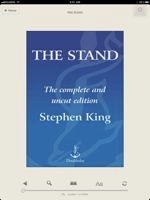 I have finally finished reading this novel. I originally became interested in it because of a line in Marjorie Garber's, "The Use and Misuse of Literature" where she noted that this novel was the third most popular novel (behind the Bible and Lord of the Rings) read by men in the US.
I have finally finished reading this novel. I originally became interested in it because of a line in Marjorie Garber's, "The Use and Misuse of Literature" where she noted that this novel was the third most popular novel (behind the Bible and Lord of the Rings) read by men in the US.
I am not a particular fan of Stephen King but I found this novel to be relatively boring. The original novel was written in 1978 and the expanded revision in 1990. His newer novel "The Dome" is much better. I do not like to spend time rehashing books that I don't like. Better to simply move on to the next and hope for better. Having said that, I rarely find myself reading books that I don't like, but this was one. A bit surprising given how popular it was in the US, but it does reinforce the overall conclusion of the survey that Garber quotes that the US doesn't read much literature.
March 2, 8:30 am Literature

Here are a few more quotes from Rumi's "The Big Red Book". Chapter 6 focuses on living. The first quote is by Coleman Barks, the others are his translation of Rumi's work:
"The living river of your life is continuously changing. Drink from it. Let that taste tell you how to move." [p. 79]
"But you go on painting pictures
and blackening pages with print,
like smoke obscuring light.
Read the day instead of books." [p. 85]
"A human body is a bow.
Breathing and speech are arrows.
When Quiver and arrows are used up or lost,
there is nothing more for the bow to do." [p. 87]
"Don't say, He's gone. He's gone.
Death has nothing to do with going away." [p. 89]
March 1, 10:00 PM Literature
 I am now about 2/3 of the way through the novel but there is still a lot to be resolved.
I am now about 2/3 of the way through the novel but there is still a lot to be resolved.
March 1, 6:40 am Literature

Here are a few quotes from Rumi's "The Big Red Book". This chapter focuses on the beauty of silence. I loved it. I really must spend more time with this book.
"I have made many elegant speeches to the assembly.
Now it is time to walk outside and be quiet." [p. 69]
"His greatest alchemy is how he undoes the binding
that keeps love from breathing deep." [p. 69]
"Now silence lets the one behind your eyes talk." [p. 72]
"The willow shakes her head,
and I have this to say to language, Leave me alone.
But language keeps chasing me, arguing." [p. 72]
"The heart is a wheat grain.
We are the mill where the body is the millstone
and thought, the moving river." [p. 73]
"You talk about my craziness.
Listen rather to the honed-blade sanity I say." [p. 77]
What a grand way to begin the morning. And to then sit and do nothing.